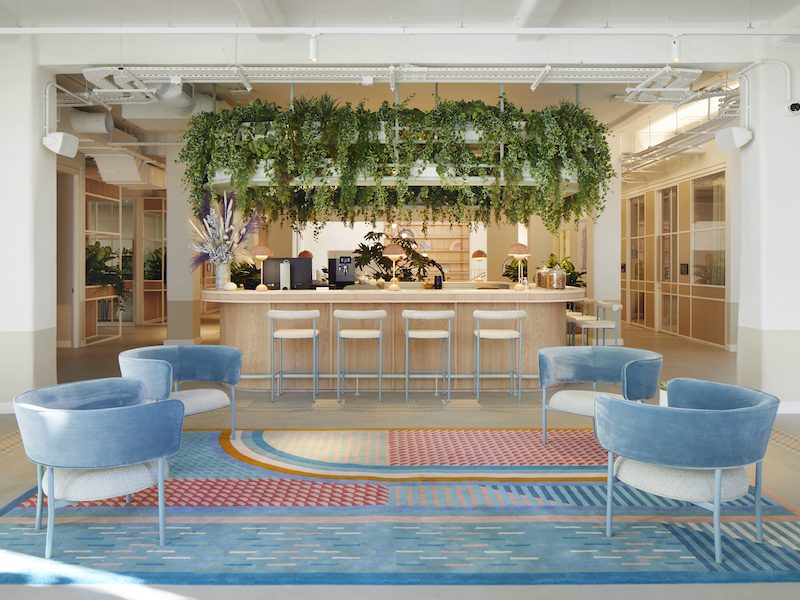
Many, who were previously wedded to this model, are considering, and moving into, forward-thinking, flexible workspaces like Fora.
Fora workspaces are beautiful, functional and consciously designed for the people using them. The flexibility we offer is also a huge incentive, proving itself one of the biggest decision-making drivers in the sector. We’re seeing this trend globally, not just in the UK.
But there are more reasons than ever, why companies are turning to flexible workspaces.
The pandemic has shown us we can effectively work from home, so the office has to be a place where people want to be. With hybrid working models, we’ve seen a lot of businesses taking similar-sized spaces but with more focus on communal areas and fewer desks to facilitate in-person collaboration.
Good companies will recognise that their staff still want that sense of belonging; somewhere that cultivates great company culture, as well as supporting their wellbeing, social connections, and cross-company interactions. With flexible offices, they can achieve all of this, with a workplace expert covering that side of things, while they focus on the business.
There’s also the opportunity to take whole floors or a whole building, making it feel like their own, without committing to a 10 – 15 year lease. We know that agility is essential. Our Residents can easily adapt their space, both in terms of scale and configuration, to meet evolving business needs.
CEOs and managers experience increasing pressure to adapt to ensure business continuity. Moving to progressive workspaces like Fora addresses the working patterns of your team and business. The “right” way of working isn’t the same for everyone. A workspace must enable productivity for different people and different working styles, with areas to concentrate and areas for energetic brainstorming. And intricacies like where will my dog sit? While traditional leases clearly have a role to play, they do not always afford occupiers the same opportunity or freedom to evolve, that flexible spaces can.
It’s no surprise that the last two years have created a pivotal change in working life practises. There is now an increasing focus on recognising and supporting mental and physical wellbeing, both in and out of the office. Managers can often be expected to double up as therapists if wellbeing is absent from their company and workspace. People want the flexibility to live their life and work at the same time – whether that’s working out, meditating, getting ready for an evening out… the list goes on.
No two Fora workspaces – we have 14 across London and Reading – are the same. They respond to the character of the area they’re in. But you’ll find conscious design, our signature biophilic influence, wellness facilities, playful colour palettes and inviting furnishing in all of them.
Take Fitzrovia, Wells Mews, for example – which opened, fully let, in December last year. Along with four floors of beautiful workspaces, there’s a grand reception space and bar, gym, restore room, beauty bar, indoor garden, reading room and even hydroponic towers, so people can pick fresh produce to eat for lunch or to take home.
At Wells Mews, everything flows, from the moment you arrive to when you leave. If you cycle in, there are drying rooms for your kit, you can lock your bike up in the cycle store, then go straight through to the shower and onto the beauty bar to get ready for work. Then you can grab your coffee and your breakfast from the kitchen. At lunch, there are spaces to read, meditate or work out, not forgetting the whole of Fitzrovia on the doorstep. We also have a 360-wellness programme and many inspiring events. All of these different elements together enhance wellbeing and make the office a great place to be.
To sum up, flexible offices are becoming the solution to so many companies’ workspace requirements because they afford the opportunity to quickly and effectively create inspiring and rewarding work environments; the space can grow and evolve as the business does; and the best flexible workspaces recognise the fundamental role people play in a business’ success. Fora understands these dynamics because they are part of our DNA, and they are driving our significant growth as we emerge from the pandemic.
 A pioneer in the festival world, Katrina Larkin co-founded The Big Chill Festival in 1994. In 2013 she worked on the redevelopment, re-branding and curation of Camden Lock Market, with great success. In 2014, Katrina joined Market Tech, overseeing 16 acres of Central London real estate, and was influential in the planning and launching of Market Tech’s coworking office space ‘The Interchange’. She was also the driving force behind the Haiti fundraiser at The Roundhouse in 2011 and sits on the charity board of Charity in the City.
A pioneer in the festival world, Katrina Larkin co-founded The Big Chill Festival in 1994. In 2013 she worked on the redevelopment, re-branding and curation of Camden Lock Market, with great success. In 2014, Katrina joined Market Tech, overseeing 16 acres of Central London real estate, and was influential in the planning and launching of Market Tech’s coworking office space ‘The Interchange’. She was also the driving force behind the Haiti fundraiser at The Roundhouse in 2011 and sits on the charity board of Charity in the City.
Katrina is also Co-Founder and Chief Creative Officer of Fora; leaders of the workspace revolution. Since launching in 2017, For a has opened 13 workspaces across London and Reading, Berkshire used by companies including Nike, Sony, and Dropbox. Flexible working company Fora is targeting an increase in the use of flexible office space in the UK emerges from the coronavirus pandemic, with the opening of a new site in the West End this summer and six further spaces in the pipeline, as well as confirming plans to expand internationally in the coming years. Forget what you know about co-working; Fora is reimagining the entire experience.
Credit caption: Fora flexible office space provider has recently opened Wells Mews.
